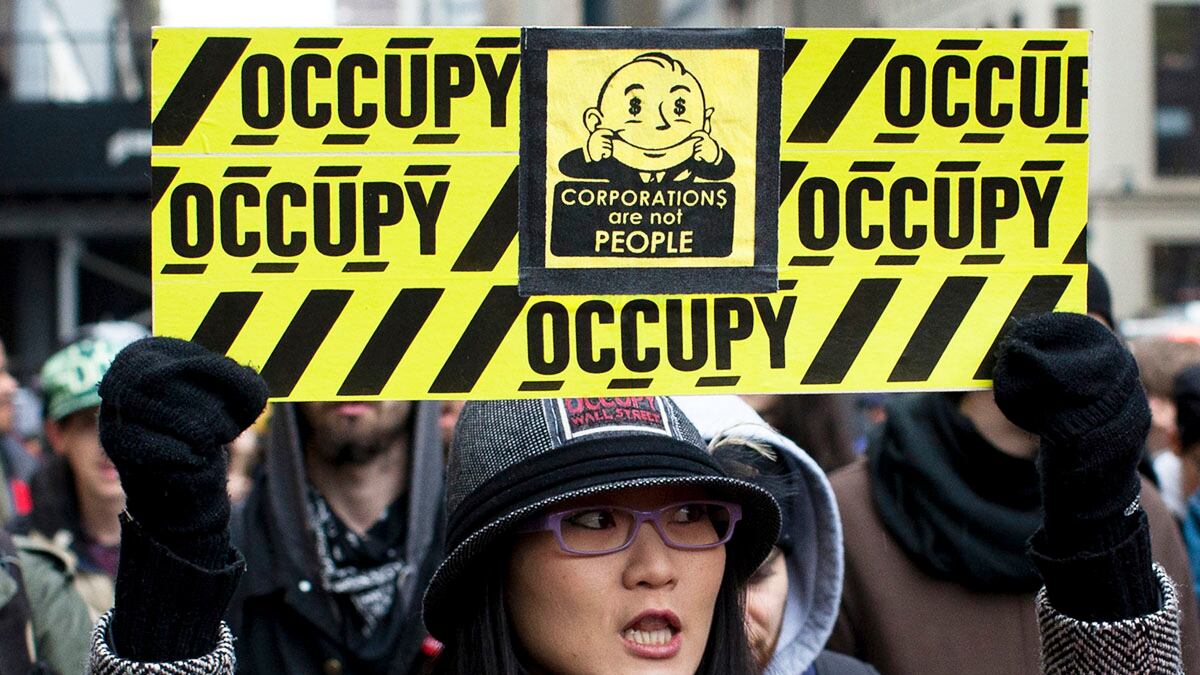After months of behind-the-scenes discussion, the latest moneyed group looking to patronize Occupy Wall Street—in implicit exchange for its “blessing” and the valuable naming rights that go with it—came out publicly this week.
A crowd of about 100 gathered at the West Park Church on the Upper West Side Sunday for an open meeting dedicated to the unveiling of the newly renamed Movement Resource Group. The 501(c)(3) is the latest incarnation of a group of wealthy donors who have been trying to plug into OWS for months. Originally called the Business Affinity Group, then the Occupy Money Group, before settling on its current name, MRG is essentially Ben Cohen of Ben & Jerry’s, whose foundation raised the bulk of the $300,000 the group has put together so far (along with ambitions of raising $1.5 million more), and a handful of rich liberal allies—also including former Nirvana manager Danny Goldberg and famed television producer Norman Lear (who wasn’t there Sunday).
The group seems to think it can purchase a piece of the occupation. Of course, it could give out the money it's raised, like any other nonprofit, but it's looking for some sort of seal of approval from the movement, and to speak for it in a sense. As it says on its just-launched website, “Due to the horizontal structure of Occupy, it is difficult for funders to connect with this nascent movement.” It's volunteering to fix that perceived problem, and to provide donors with a “single point of contact.” On Sunday, the group read directly from the sanitized language on its website; its version of the occupation looked like a corporate PowerPoint presentation.

While the messages of “the 99 percent” and “economic justice” were fairly conventional—thus their broad appeal—the underlying structure of the movement has always been radical. Like so many critics and would-be friends of the occupation, MRG has mistaken OWS’s leaderless structure for a posture or negotiating position, rather than a principle that can’t be compromised without corrupting the whole enterprise. In place of that structure, MRG aims to support “replicable” actions and clear “messaging,” to use its money to help define what is—and what is not—part of this movement. This would presumably be decided by a paid staff, in consultation with Cohen.
“Essentially this is a group of very wealthy people who have picked a handler to deal with Occupy Wall Street," academic administrator and veteran occupier Ravi Ahmad told The Wall Street Journal. "They've re-created what's wrong with nonprofits and philanthropy structures." (The Journal story was inaccurately titled "Occupy Groups Get Funding," suggesting that OWS has reached an arrangement with MRG, which it has not.)
The presentation began with the group’s board (all white, just one woman) seated in a row of chairs facing the people in attendance. This is not the normal set-up for OWS, which operates in a circle with independent facilitators. Even before the presentation began, the group had made clear it either did not understand or did not accept horizontalism, one of OWS’s very few dogmatic principles.
For an hour, the members regaled the occupiers with their bios and backgrounds: how they got rich and stories of their activist “cred.” The crowd, made up largely of dedicated and longtime movement members, wanted to get to the meat of the matter: the money.
Six months after OWS began and three months after the NYPD violently “cleaned” Zuccotti Park, there are a lot of occupiers struggling to make ends meet—especially those who are new to activism and are relying on the money coming through the New York City General Assembly, which has nearly run through its remaining funds. (Occupy Wall Street, I should note, has never actively fundraised.)
The protesters are hungry. And when these latest moneymen moved in, it felt like a two-way con. The rich people were trying to buy a piece of OWS on the cheap. Desperate protesters were there to see if they could get one over on the rich guys by taking their money without sacrificing anything of value, namely their values.
In exchange for them, MRG is offering a few national grants of up to $25,000, with proposals submitted to a board made up of five rich people and five occupiers selected by those rich people. They’ve also set aside $100,000 for “other projects,” any loose funds for “stipends” for “core activists,” with MRG determining that paid “core.” The biggest budget item, at $150,000 fully half of the money they’ve raised so far, would go to the “national office” in New York.
I asked myself: how do these guys have the nerve to present this structure?
I remembered thinking the same thing when Alec Baldwin—literally a shill for Capital One Bank—showed up at the “Occupied Office” (50 Broadway) one afternoon. Or when Russell Simmons showed up early on and offered big money with strings attached. This is the same guy who was hawking his “self-help” book, Super-Rich. We’re talking enormous nerve.
When they could delay the inevitable questions no longer, the members of MRG finally opened up the room for questions. Marisa Holmes, a member of the facilitation working group and well-respected longtime member of the movement, spoke first, and for many of us:
“I’m sure you all have the best of intentions and want to help the movement. And in your experience, helping the movement has meant creating hierarchies and processes of allocating funds and having your own responsible people to carry out. But that is exactly the kind of organization OWS is not and has never been about.”
Marisa paused, and continued: “I can’t get rid of this sinking feeling in my stomach that this will destroy the very foundation of the movement I tried to build.” She concluded with a simple question: “What do you hope to achieve with this?”
The panel sat in silence. After months of quiet talk with members of the working groups before Sunday, could they really have been unprepared to answer that? Finally, Cohen responded sheepishly: “Well, I guess what we hope to achieve is to help the movement grow and thrive.”
The questions continued, with occupiers expressing disdain for the plan alternating with those looking for a piece of the pie, often asking questions that doubled nicely as brief grant proposals.
OWS was never set up to handle money. The same organizational structure that fueled the movement’s success is clearly incompatible right now with allocating funds.
For many Americans, including myself, OWS was their first taste of something truly different. The movement captured the American zeitgeist and the money poured in, in $10s and $20s, from citizens looking to contribute. That cash—about $800,000 in total, or less than many bankers’ base pay, never mind their bonuses—in turn attracted the hustlers: spangers and low-level cons, yes, but also politicians and professional progressives and limousine-liberal philanthropists like our would-be MRG patrons.
Despite the notion that there is a split among the remaining occupiers between “radicals” or “anarchists” and tamer “reformists,” the bifurcation is really about something else: the money. On one side are the hustlers, and on the other are those who understand that the only way to effectively create a society that is not a zero-sum game of money, power, and privilege is to reject the hustle in every way.
It is the latter group that created this movement, not the reformists and philanthropists, NGOs and professional progressives like Van Jones (“pro-pros,” as a friend describes them) who have proved for years that they are better equipped to profit from the rhetoric of change than to actually produce it.
MRG’s website states that it will fund activities “communicating to the general public underlying causes for the problems in our society and advocating actions to address them.” In other words, a group of wealthy capitalists is going to decide the causes of and solutions to our society’s problems, and funnel cash to those who are on the same page. The funding model epitomizes the insular bubble those with power and privilege live in.
And they will not surrender that power and privilege willingly. We do not expect our stated adversaries to do so. But we must not expect sympathetic capitalists to give it up either.
The meeting Sunday petered out with the scheduled pizza delivery, as people drifted toward the food and the donors slipped off the hook and quietly out the side door. The left-in-the-air outcome was predictable. As anyone who’s attended or perhaps even read about a general assembly or spokescouncil knows, consensus is an arduous process, and there aren’t leaders who can simply step in and speak for the group. MRG, though, seems to have treated the meeting mostly as Kabuki: its website is already accepting grant proposals.
Cohen is openly aiming to yoke the Occupy movement to mainstream progressive causes, telling Thom Hartmann Tuesday that he’s “been working on progressive social change … for the last 20 or so years, and we haven’t been getting that far. The missing ingredient has been a massive grassroots movement, and that’s what the occupy movement has the potential of becoming. We’re incredibly excited and incredibly hopeful that we’ll be able to take advantage of this potential.”
Occupy Wall Street began with people laying their bodies on the line—willing to sacrifice their physical comfort to prove their conviction—and in the process built solidarity. If MRG’s wealthy donors wanted to show solidarity, they don’t have to join us in the streets. But they must have the trust to approach us with no strings attached. The movement is not about a quid pro quo. It’s not a hustle. And it is not a placeholder for another useless pro-pro operation, complete with office space and staff.
Despite MRG’s hopes to speak for the occupation, the Organization Working Group, whose members have been in discussions with Cohen for months now, made clear in an open letter that they have not come to terms. It ends:
“By anointing a paid few to speak for the 99% MRG subverts the spirit of the Occupy movement and thus may actually prevent an authentically national Occupy movement from synthesizing.
“We have only a few unbreakable laws within OWS, the most important of them being ‘don't speak for us.’"






